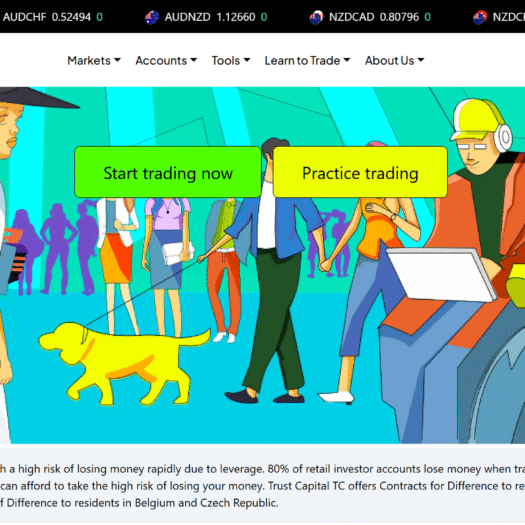
7 Mixed Signals: Why TrustCapitalTC.eu Offers Promise But Raises Serious Questions
7 Mixed Signals: Why TrustCapitalTC.eu Offers Promise But Raises Serious Questions

TrustCapitalTC.eu (Trust Capital TC Ltd) positions itself as a regulated CFD/forex broker for European clients, with some apparently solid credentials. On the positive side, it ticks many of the boxes traders look for: CySEC regulation, published legal documents, educational resources, MetaTrader platform support, etc. On the negative side, there are recurring complaints, red flags, and transparency issues that suggest caution. Below are seven mixed signals every trader should understand fully before dealing with TrustCapitalTC.eu.
1) Regulation by CySEC is a strong plus—but not a guarantee of flawless service
TrustCapitalTC.eu is regulated in Cyprus by the Cyprus Securities and Exchange Commission (CySEC), under license number 369/18. This regulatory status implies that it must obey EU/MiFID II rules: segregated client funds, best execution, published policies, etc. That is a serious positive—it offers legal recourse, consumer protection, audits, etc. However, being regulated does not mean perfect. As with many brokers under regulation, complaints about withdrawals, support, or discrepancies in advertised vs real trading conditions still emerge. Regulation reduces risk, but does not eliminate it.
2) Trading instruments and conditions are decently varied but not outstanding
TrustCapitalTC.eu offers CFDs on over 25 forex pairs, plus gold, silver, indices, commodities, oil, and cryptocurrencies. It uses the MetaTrader 4 platform (including mobile and web versions). The minimum deposit, at least on certain account types, is about USD 250. Spreads start from around 0.9 pips on certain “Solo”-style accounts. These conditions are more rather than less competitive than some brokers, especially for traders who value platform stability, regulatory oversight, and decent liquidity. On the flip side, spreads / costs may widen during volatile times; and some costs or terms (commissions, withdrawal fees, etc.) are not always completely transparent until you open an account or request services.
3) Transparency and disclosure are present—but some statements leave questions unanswered
TrustCapitalTC.eu publishes legal documentation, risk disclosures, execution quality statements (for example the 2022 Execution Quality Summary Statement). It also publishes Pillar III / Market Discipline disclosure reports under EU regulation. These are good signs for accountability. However, some external reviews and feedback point out that while the legal and regulatory documents exist, users sometimes find the “fine print” has clauses that allow the broker significant discretion (e.g. changing spreads, freezing accounts, defining “abusive trading,” or increasing margin requirements). Also, some users report difficulty getting clear answers about commission charges on certain account types. The presence of terms that are vague or leave room for subjective interpretation increases risk.
4) Customer feedback shows both satisfaction and serious complaints
On Trustpilot, Trust Capital has mixed reviews: some clients speak well of the educational materials, the support, explanation of trading, etc. Others, however, complain that withdrawals are delayed or communications drop off when they try to withdraw profits. One user said that things were fine “as long as I kept increasing capital” but once they tried withdrawing something, they got silence. On community and review forums (e.g. ForexPeaceArmy), people mention both the positives (ease of use, MT4, asset variety) and negatives (slippage, withdrawal delays, inconsistent spreads, supportive behavior changing when account sizes or profits increase). These mixed reviews suggest the broker works well for some, but not uniformly for all.
5) Safety and client-protection features are in place—but with limits
Trust Capital offers “negative balance protection” for retail clients (i.e. you should not lose more than your deposit) under its regulated CySEC entity. It also uses segregated client funds and publishes best execution / execution quality reporting. Moreover, there are policies around risk, complaints handling, etc. Despite this, user reports indicate that actual experience of support, withdrawals, and sometimes cost behavior doesn’t always match the ideal promised in these documents. Also, some user feedback implies that support or speed of resolution is variable depending on region, account size, or deposit method.
6) Pricing, commissions, and account types offer options—but with trade-offs
TrustCapitalTC.eu has a “Solo” account (minimum deposit ~$250) with spreads starting from ~0.9 pips and no trading commission on that account type. It also has a “Together” account (higher deposit) with different spreads / possibly commission. It supports scalping, hedging, use of expert advisors (EAs) via MT4. The trade-off: the more flexible or premium account types often cost more, and sometimes the advertised spread is “from” figure under ideal conditions. Also commissions / fees on trades, or underlying financing (swaps / overnight), may reduce net returns. For high-frequency traders or large volume, these differences matter a lot.
7) Reputation and trust scores have warning flags
Some independent trust / rating sites raise concerns. For example, ScamAdviser gives the trust score of trustcapitaltc.eu a “low trust score.” There are articles and blog posts warning of possible clone-branding or misleading marketing practices.
Some reviews assert that the broker looks legitimate (license, regulations, documentation), but that some domain names or affiliate promotions may mislead users by presenting overly rosy impressions. Also, although regulatory status is CySEC and legal entity details appear available, complete transparency about ownership, key management personnel, or track record is less than some older brokers.
Conclusion: Final Verdict on TrustCapitalTC.eu
TrustCapitalTC.eu comes with a mixture of genuine strengths and material risks. If you are a trader considering using it, the decision depends a lot on what you value, how much you trade, how important withdrawals and legal protection are to you, and how comfortable you are with some of the uncertainty that shows up in user feedback.
On the positive side, regulation by CySEC (a well-recognized EU regulator) is a significant safety pillar. Tools like MT4, Execution Quality reporting, disclosed legal documentation, negative balance protection, and public regulatory disclosures are far better than what many unregulated brokers offer. The availability of a “Solo”-type account with relatively moderate minimum deposit and spreads starting under 1 pip under ideal conditions is appealing. For traders who trade modest volume, want to learn with a regulated broker, and prioritize safety over cutting every cent of cost, TrustCapitalTC.eu appears to be one of the more credible options currently on the market.
However, the risks are nontrivial and must be managed carefully. The negative feedback about withdrawal delays, support responsiveness (especially when withdrawing profits or for larger accounts), and discrepancies between advertised vs live spreads or costs suggest that real-world trading may often deviate from promotional materials. Traders who expect perfect consistency will likely encounter friction. Also, “vague” or broad clauses in legal terms (account restrictions, discretionary spread widening, etc.) create uncertainty. In regulated environment this is less ominous, but still worth noting.
Another caution: trust scores from external sites (ScamAdviser etc.) suggest some users have had problematic experiences; clone-branding warnings, mixed reviews, and issues of domain or affiliate confusion are cautionary. Even though the licensed status is solid, these external perceptions can affect reputation, and may reflect genuine issues in certain cases.
If I were advising someone now, here’s what I’d recommend:
- Start with a demo account, to get a feel for execution, spreads, platform behavior before risking money.
- Once moving to a live account, deposit a modest sum first, make trades, and try a small withdrawal to check how well the withdrawal process works for your chosen payment method and your country.
- Choose the simpler account type (Solo) initially, to avoid complications.
- Read all legal documents thoroughly, especially sections on withdrawals, commissions, spreads, account restrictions, “market abuse” or account freezing, “best execution,” and any mention of discretionary powers.
- Use conservative leverage until you can verify execution behavior (slippage, spread widening under volatility).
- Keep all documentation (screenshots of quotes, support chats, trading logs, withdrawal requests) in case of dispute.









